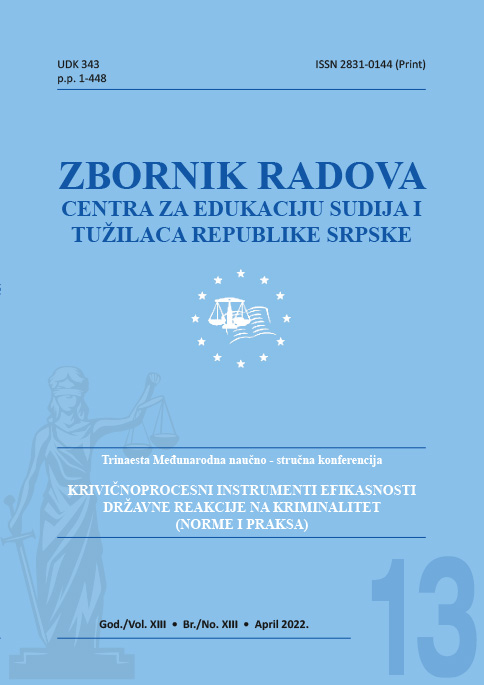A VIEW OF CRIMINAL PROCEEDINGS IN THE USA
DOI:
https://doi.org/10.7251/CEST1322163SKeywords:
Criminal Procedure, US Constitution, adversarial proceedings, federal rules, jurisdictionAbstract
According to the federal system of government, the federal (i.e. national) government and the government of each one of the 50 US states has independent authority to enact criminal laws applicable within the territory of its jurisdiction. Also, each state has the authority to enforce criminal laws through its own criminal procedure laws, through its own criminal law agencies. Thus, in many respects, there are 51 different criminal proceedings, one for each state and one for the federal jurisdiction. Fifty second jurisdiction is secured by the decision of the US Congress (Amendment XXIII to the US Constitution) to treat the District of Columbia separately, which has a separate criminal code and criminal procedure code that are separated from those applicable in federal criminal laws across the country.
In many areas where both federal and state governments have the authority to regulate an area, the federal system dominates. Federal law is the basic source of law and the vast majority of all enforcement proceedings are introduced into the federal structure (administrative or judicial). Similar dominance is not found in the sphere of criminal law. Using any of the traditional standards to measure its share of the national criminal justice system, the federal criminal justice system is nothing more but one of many.
The presence of 52 different criminal proceedings would be less significant if these proceedings were the subject of a single act prescribing one exclusive, comprehensive regulation for all 52 jurisdictions. Contrary to the impression sometimes conveyed by constitutional experts, the US Constitution is not such an act. This does not challenge the characterization of federal constitutional law, as interpreted by the US Supreme Court, as “the most important source of criminal procedure law”. It is the only source of criminal justice provisions applicable in all 52 jurisdictions. It “closes” 52 jurisdictions into a basic procedural structure that guarantees uniformity in majority of comprehensive principles in different procedures.
The U.S. Constitution, for many aspects of criminal procedure, also requires the application of special standards (sometimes quite detailed) that implement those standards. Nevertheless, the obligations imposed by the US Constitution are not extensive or exclusive enough to place the law of individual jurisdictions on a relatively insignificant role in regulating criminal proceedings. For many aspects of criminal procedure, the laws of individual states provide much more than the standards from the US Constitution. Even where the US Constitution is dominant, the “local” law of one jurisdiction often still plays a significant role. Of course, wherever the law of one jurisdiction has control, there is always the potential for variations in the content of the law from one jurisdiction to another.
